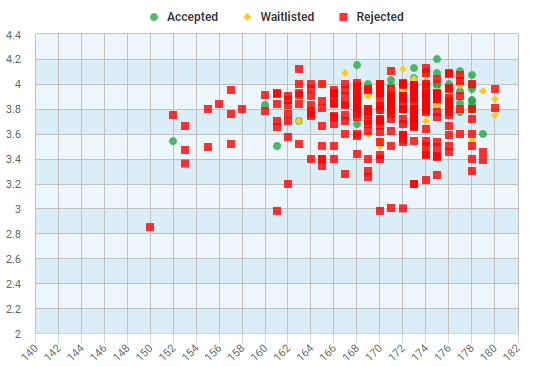Charlotte School of Law
General Info

Charlotte School of Law is a private for-profit law school in Charlotte, North Carolina. Established in 2006, it is the newest of the three schools operated by the InfiLaw Corporation. The school received its ABA accreditation in 2011. Its stated academic mission prioritizes student diversity and practical skills, which are backed by a part-time and evening program as well as close cooperation with the Mecklenburg County and North Carolina state bar associations.
Contact information
- (Website) https://www.charlottelaw.edu/
- (Admissions Dean) admissions@charlottelaw.edu
- (Location) Charlotte, NC
Charlotte School of Law Admissions
Charlotte School of Law is considered a Somewhat Competitive law school, which accepts only 66% of its applicants. Comparatively, Charlotte is Higher than the average cost for law school.
| Applications | Offers | Matriculated | |
|---|---|---|---|
| Class of 2029 | 2260 | 1470 (65.04%) | 309 (13.7%) |
| 25% | Median | 75% | |
| GPA | 2.51 | 2.82 | 3.17 |
| LSAT | 140 | 142 | 145 |
Tuition And Financial Aid
| In-State Resident | Non-Resident | |
|---|---|---|
| Full Time | $41,348 | $41,348 |
| Part Time | $33,448 | $33,448 |
Living Expenses
- Living on-campus: $22,620
- Living off-campus: $22,620
- Living at home: $22,620
Important Dates
- Early Decision 1: N/A
- Early Decision 2: N/A
- Regular Decision: N/A
- Application Fee: $50
Charlotte School of Law Admissions Predictor Tool
Charlotte School of Law COMPARISON TOOL
Charlotte School of Law


Suggested Schools
Charlotte School of Law Community
Charlotte School of Law is considered to have a Somewhat Favorable student to faculty ratio. The average class size for 1L sections is approximately Above Average compared to other law schools. Student diversity at Charlotte is Above Average.
Student body
Faculty Statistics
- Full Time: 43
- Part Time: 54
Faculty
- # Female Faculty: 51
- # Minority Faculty: 22
Ratio
21.3 Students
1 Faculty
Housing Options
- On Campus Housing: No
- Graduate Housing: No
- Law Specific Housing: No
Charlotte School of Law Curriculum
The size of 1L sections affects the quality and consistency of teaching in law schools. Generally with smaller 1L section sizes, students receive more individualized attention. Charlotte School of Law 1L section size is 19% larger than law schools in North Carolina and 13% larger than all PRIVATE law schools.
1L Section Size Comparison
Positions Available in Advanced Courses
- Simulation Courses: 2481
- Faculty Supervised Clinics: 253
Students Involved in Advanced Activities
- Field Placements: 351
- Law Journals: 109
- Moot Court/Mock Trials: 0
Attrition Rates
- First Year: 44.6%
- Second Year: 5.7%
- Third Year: 2.9%
- Fourth Year: 1.6%
Charlotte School of Law Employment
Deciding to attend law school requires a large financial investment with the goal of securing employment upon graduation. The Charlotte School of Law class of 2024 had an employment rate of 79% with 2% pursuing an additional degree.
Employment Comparison
In 2024, 73.6%% of students reported their employment status 9-months after graduation.
Type of Employment
- Law Firms: 39.0%
- Business: 38.0%
- Government: 5.0%
- Public Interest: 12.0%
- Academia: 1.0%
- North Carolina: 58%
- South Carolina: 12%
- New York: 3%
Bar Passage Rates
- Reporting: 73.6%
- First Time Takers: 368
- Average School: 57.9%
- Average State: 69.7%
- Pass Difference: -11.7%
Top Bar Jurisdiction
- North Carolina: 69.1%
- Passed: 135 of 237 (57.0%)
- State Average: 69.7%
- Difference: -12.2%
